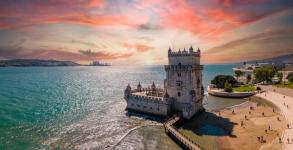Blog • Published on:May 12, 2025 | Updated on:July 8, 2025 • 25 Min
Safest Countries in Europe to Live and Visit
Safety isn’t just about avoiding crime, but also about long-term stability, overall quality of life, and financial peace of mind. When considering a European country for citizenship or residency, security becomes a vital factor in protecting your investment, building a stable future, and ensuring a sense of comfort for you and your family.
Even the most beautiful country loses its charm if you don’t feel safe walking the streets. No one wants to risk their lifestyle on political unrest, weak infrastructure, or rising crime.
For expats, investors, and families alike, safety is essential. Choosing the wrong destination could mean grappling with increasing security issues, unreliable healthcare or emergency response, or unpredictable government policies.
So, which countries in Europe truly offer top-tier safety? And what does “being safe” actually mean in this context? Let’s break it all down.
You can explore the top European countries for residency, including investment options, benefits, and eligibility criteria, in our in-depth guide: Top European Countries for Permanent Residency 2025.
Top 10 Safest Countries in Europe
How Safety is Measured in European Countries
Safety is not a one-dimensional concept. Some countries have low crime rates but weak legal systems. Others may have strong economies but face social unrest. To evaluate safety effectively, three main factors are considered:
- The Global Peace Index (GPI): A widely recognized ranking system based on crime rates, conflict levels, and law enforcement effectiveness
- Crime Rates and Public Safety: Statistical data on violent crimes, thefts, and fraud, along with police efficiency
- Quality of Life and Safety Connection: The link between crime rates, healthcare access, economic stability, and infrastructure
Each of these provides a clearer picture of what it means to live in a truly safe country.
Global Peace Index Explained
The Global Peace Index (GPI) is one of the most comprehensive tools for assessing national safety. Published annually by the Institute for Economics & Peace, it ranks over 160 countries based on their levels of peace and security.
How the GPI Measures Safety
The GPI evaluates safety using 23 indicators, categorized into three main areas:
- Societal Safety and Security: Crime rates, political stability, and effectiveness of law enforcement
- Ongoing Conflict: The presence of internal or external disputes, civil unrest, or diplomatic tensions
- Militarization: Defense spending, military presence, and overall international relations
Why the GPI Matters for Residency and Citizenship
Countries with lower GPI scores are considered safer, more politically stable, and secure for long-term investments. This makes the index a valuable resource for those considering European residency or citizenship programs.
For instance:
- Iceland has consistently ranked as the safest country in the world for over a decade.
- Switzerland is among the most peaceful due to its neutral stance and low crime rate.
- Portugal is the safest country in Southern Europe and offers one of the most attractive residency programs.
While the GPI provides a broad overview, crime rates offer more detailed insights into everyday safety.
Crime Rates and Public Safety Statistics
Crime rates are often the first measure people consider when assessing safety. However, looking at overall crime statistics alone can be misleading. Some countries have high rates of petty crime but low violent crime, while others may have low reported crime due to underreporting or lack of police efficiency.
Key Crime Indicators to Consider
- Violent Crime: Incidents such as assaults, homicides, and organized crime activity
- Theft and Property Crime: Burglary, fraud, and street crime
- Police Effectiveness: Public trust in law enforcement, response times, and case resolution rates
- Corruption and Transparency: A strong legal system ensures safety applies to everyone, not just those with resources
Switzerland, for example, has some of the lowest crime rates in Europe due to an effective police force and strong rule of law. Meanwhile, Portugal and Denmark have low violent crime rates but experience some levels of petty crime in tourist areas.
How Public Safety Affects Residency and Investment
A country with a strong public safety record offer:
- Greater security for property investments
- Lower insurance costs
- More long-term stability for residents and expatriates
Switzerland’s well-functioning legal and security systems make it a preferred destination for investors. Austria, similarly, provides strong legal protections for both locals and foreign residents.
Crime statistics alone do not define a country's safety, quality of life plays an equally crucial role.
Quality of Life and Safety Connection
A country can have a low crime rate but still be unsuitable for residency if it lacks healthcare, emergency services, or economic stability. Safety goes beyond avoiding crime; it includes access to essential services and overall well-being.
What Makes a Country Truly Safe to Live In?
- Healthcare System: Availability of high-quality medical services and emergency care
- Emergency Response: The efficiency of ambulance, police, and fire services
- Infrastructure and Public Services: Reliable transport, utilities, and public safety measures
- Economic Stability: Consistent job opportunities and financial security
- Disaster Preparedness: Effective systems for handling natural disasters and crises
For example:
- Finland ranks among the safest countries due to its low crime rates, excellent healthcare, and strong economy.
- Norway is well-known for its disaster preparedness, political stability, and high-functioning welfare system.
A safe country should provide more than just physical security. It should ensure a high quality of life for its residents.
Top 10 Safest Countries in Europe Explained
Europe has long set the global standard for safety, ranking consistently among the most peaceful regions in the world. The very foundation of the European way of life is built on stability, social trust, and strong institutions, factors that contribute to making its cities and communities some of the safest places to live and visit.
But not all European countries offer the same level of security. While Europe as a whole prioritizes public safety, some nations go further, creating environments where residents feel an extra layer of protection.
Whether it’s strict law enforcement, effective emergency services, or a culture of social responsibility, these countries provide a sense of security that allows people to live without constant concern for their safety.
1. Iceland: Europe’s Safety Champion
Iceland has held the title of the safest country in the world for more than a decade, and it’s not hard to see why. This Nordic nation has virtually no violent crime, high social trust, and a well-functioning legal system that prioritizes fairness and stability.
Crime rates in Iceland are among the lowest globally, and many residents don’t even lock their doors at night. With a small, close-knit population, Iceland has fostered a culture where mutual respect and trust replace the need for heavy policing.
Unlike most European nations, Iceland does not have a standing army. Instead, it relies on diplomatic neutrality and international alliances to maintain peace. This lack of militarization contributes to a low threat of terrorism or geopolitical tensions, making Iceland an incredibly stable place to live.
Living in Iceland: What to Expect
- A government that works - Corruption is practically nonexistent, and institutions function transparently.
- One of the best emergency response systems - Ambulances and law enforcement services are efficient, covering even remote areas.
- Minimal environmental risks - Despite its volcanic landscape, Iceland has strong disaster preparedness.
For anyone seeking an ultra-secure, stress-free lifestyle, Iceland remains unmatched in Europe.
2. Portugal: Combining Safety with Residency and Citizenship Options
Portugal has become one of Europe’s most desirable destinations not just for its warm climate and affordability but for its remarkable safety. The country has an exceptionally low violent crime rate, political stability, and a strong sense of community, qualities that have made it a hotspot for investors, expats, and retirees.
Unlike many other southern European nations, Portugal has managed to maintain a high level of internal security without relying on excessive policing. The crime rate is significantly lower than in neighboring Spain and France, making it one of the safest places to visit or settle in.
While petty theft can occur in major cities like Lisbon and Porto, violent crime is almost unheard of. Police presence is strong but non-intrusive, ensuring that both locals and visitors feel secure.
Residency and Citizenship Options in Portugal
Portugal's Golden Visa program has undergone significant reforms, eliminating real estate investments as a qualifying option. Currently, investors can secure residency through the following avenues:
Capital Transfers
Investment Funds: A minimum investment of €500,000 in qualified Portuguese investment or venture capital funds that support sectors such as technology, industry, or other areas of economic growth.
Business Investments
Job Creation: Establishing a business in Portugal that creates at least 10 full-time jobs, directly contributing to the local economy.
These investment options provide a pathway to residency in Portugal, a country known for its safety, stability, and high quality of life. After five years of residency, individuals may be eligible to apply for Portuguese citizenship, subject to meeting language proficiency and other requirements.
Read more about the Portugal Golden Visa program, including the application process, investment requirements, and benefits, in our detailed blog: Portugal Golden Visa Program.
3. Austria: High Security and Quality Living Standards
Austria is often recognized for its high standard of living, strong social welfare system, and incredibly low crime rates. The country’s political neutrality and stable governance contribute to an environment where people feel secure, whether in major cities or rural areas.
Vienna, the capital, has frequently been ranked as one of the best cities in the world to live in. The streets are clean, public transportation is well-organized, and law enforcement is highly efficient. Austria also has one of the strictest gun control policies in Europe, which has resulted in lower rates of violent crime compared to neighboring countries.
The key Safety Measures in Austria
- Minimal political unrest - Austria avoids major conflicts and maintains a balanced diplomatic approach.
- Well-funded public services - Emergency response times are among the best in Europe.
- Strong legal protections - Both locals and foreign residents benefit from Austria’s well-enforced legal system.
For investors and families looking for a safe, well-organized country with a high quality of life, Austria is an excellent choice.
4. Switzerland: Safety and Political Stability
Switzerland is one of the most politically stable nations in the world, with a strong economy, a trusted legal system, and exceptionally low crime rates. The country’s commitment to neutrality and diplomacy has helped it avoid involvement in conflicts, further reinforcing its security.
Unlike many European countries, Switzerland is prepared for any crisis. It has one of the highest per capita emergency shelter capacities, ensuring that residents are protected in case of disasters or geopolitical issues.
The country also has one of the most secure banking systems in the world, making it a prime destination for high-net-worth individuals looking to safeguard their assets.
Switzerland’s low crime rate is a direct result of its strong law enforcement policies, efficient legal system, and highly educated population. Even in large cities like Zurich and Geneva, violent crime is rare.
Why Switzerland Remains a Top Choice for Safety
- One of the most reliable emergency response networks in the world
- Strong banking privacy laws and asset protection for investors
- A diplomatic nation with almost no risk of war or internal conflict
Switzerland remains one of the best places for those who value absolute security, financial stability, and long-term peace of mind.
5. Slovenia: Eastern Europe’s Safety Haven
Often overlooked in discussions about safety, Slovenia has quietly become one of the most secure and stable nations in Europe. It has low crime, excellent public safety, and a high-functioning healthcare system that rivals those of Western European nations.
What makes Slovenia stand out is its combination of affordability and security. While many people associate Eastern Europe with higher crime rates, Slovenia has one of the lowest crime rates in the entire region, making it an ideal destination for those looking for a safe yet cost-effective place to live.
The capital, Ljubljana, has a near-zero violent crime rate, and the country’s public services are well-organized, ensuring a smooth and secure daily life. Slovenia also ranks high in environmental safety, offering clean air, well-maintained public spaces, and protected natural reserves.
Living in Slovenia: Key Safety Benefits
- No history of major political unrest - Slovenia has remained peaceful since gaining independence.
- Excellent emergency medical care - The country offers high-quality healthcare with fast response times.
- Affordable yet secure - One of the safest places in Europe for those looking to move without the high costs of Western Europe.
6. Denmark: Scandinavian Security and Well-being
Denmark’s low crime rates are a result of effective policing, strong legal enforcement, and a culture of trust. Law enforcement agencies operate with high levels of transparency, ensuring that both residents and visitors feel protected.
Violent crime is rare, and most offenses are petty crimes like pickpocketing, which are primarily confined to tourist areas. Strict firearm laws contribute to the overall sense of security, making Denmark one of the few places where even major cities remain safe at night.
Social Safety and Public Trust
Denmark’s high level of social cohesion plays a significant role in its safety. Citizens trust government institutions, and there is a strong sense of shared responsibility for maintaining order. This is evident in the country's low levels of corruption and minimal police brutality.
Additionally, public infrastructure, emergency response systems, and well-planned urban spaces contribute to the overall security of the country. Pedestrian-friendly city designs, well-lit streets, and efficient public transportation systems reduce risks commonly seen in other metropolitan areas.
7. Ireland: Safe Communities and Investment Potential
Ireland maintains one of the lowest violent crime rates in Europe, largely due to strict law enforcement, strong community ties, and a well-functioning judicial system. The country places a heavy emphasis on policing through public trust rather than force, resulting in high levels of cooperation between citizens and law enforcement agencies.
Criminal activity, particularly violent crime, is far less common than in other Western European nations. Dublin, the capital, is known for its safety, with most crimes being minor incidents such as pickpocketing in tourist-heavy areas rather than serious offenses.
Economic Stability and Social Safety Nets
One of the key factors contributing to Ireland’s security is its stable economy and well-developed social support systems. The country’s strong GDP growth, low unemployment rate, and high-quality healthcare services ensure that social unrest remains minimal.
With a strong investment climate, Ireland attracts high-net-worth individuals, global businesses, and professionals, all of whom contribute to the nation’s continued security and prosperity.
8. Finland: Low Crime Rates and Social Trust
Finland’s police force is regarded as one of the most trusted in Europe, operating with high efficiency and minimal corruption. The country has some of the lowest crime rates in the world, with both violent and property crimes being rare.
Unlike many other nations, Finnish law enforcement is highly community-oriented, emphasizing conflict resolution and de-escalation rather than force. This approach has resulted in a safe environment where residents feel secure in both urban and rural settings.
Safety for Families and Women
Finland ranks among the safest countries for women and families, regularly scoring high on the Women, Peace, and Security Index. This is due to strict laws against domestic violence, gender equality policies, and an efficient justice system.
Public services, including healthcare, education, and childcare, further contribute to a secure and predictable lifestyle, making Finland a top choice for families seeking stability and security.
9. Norway: Safety and Natural Disaster Resilience
Norway’s safety is reinforced by strict legal frameworks, high police efficiency, and a well-functioning social system. The country has one of the lowest incarceration rates in the world yet maintains high levels of public safety due to its effective rehabilitation programs and strong societal trust.
Gun laws in Norway are highly regulated, which contributes to the low rate of violent crime. Unlike in many countries, mass shootings and gang-related violence are almost nonexistent.
Disaster Preparedness and Environmental Safety
Norway’s geography exposes it to harsh winters and extreme weather, but its infrastructure is built to handle natural challenges. The government invests heavily in disaster preparedness, early warning systems, and emergency response training to ensure public safety in case of avalanches, floods, or storms.
With one of the most well-maintained emergency services networks in Europe, Norway offers a level of security that extends beyond crime prevention, ensuring the safety of its residents in all aspects of life.
10. Malta: Mediterranean Security with Citizenship Benefits
Malta ranks as one of the safest Mediterranean countries, with a low crime rate and a high level of public security. The country’s small size contributes to efficient policing, as law enforcement is able to monitor activity across the nation with a high level of control.
While petty crimes like pickpocketing can occur in tourist areas, violent crime is rare. The country’s political stability and strong legal framework ensure that residents feel safe, whether they live in cities or coastal towns.
Residency and Citizenship Options in Malta
For those seeking to live in a secure and politically stable Mediterranean country, Malta offers two primary options:
Malta Permanent Residence Program (MPRP)
The MPRP allows non-EU nationals to obtain permanent residency in Malta through specific financial contributions and investments.
Property Purchase: Minimum property value of €350,000 in central Malta or €300,000 in the southern region or Gozo.
Property Lease: Minimum annual rent of €12,000 in central Malta or €10,000 in the southern region or Gozo.
Donation: A mandatory donation of €2,000 to a registered philanthropic, cultural, sport, scientific, animal welfare, or artistic organization.
These investments grant the main applicant and their qualifying family members permanent residency rights in Malta, providing access to a stable environment, quality healthcare, and educational systems.
Citizenship by Naturalization for Exceptional Services
This program, also known as the Malta Citizenship by Naturalization for Exceptional Services by Direct Investment, offers a pathway to Maltese citizenship for individuals and families who make significant contributions to the country. The investment requirements include:
Direct Investment:
- €600,000 for a residency period of 36 months before citizenship eligibility.
- €750,000 for a faster track residency period of 12 months before citizenship eligibility.
Donation: A philanthropic donation of €10,000 to an approved Maltese non-governmental organization.
Both programs provide access to a safe, English-speaking European country with excellent healthcare, strong legal protections, and a high standard of living.
Safety Considerations for Families Seeking European Residency
For families considering relocation to Europe, safety goes beyond crime rates. It’s about finding a place where children can grow up in a secure, supportive environment with access to quality education, healthcare, and public services.
Many European nations offer strong social safety nets, high living standards, and well-regulated legal systems, but some stand out as particularly safe and family-friendly.
Best European Countries for Children's Safety
Children's safety also includes social trust, healthcare access, school security, and overall well-being. Countries that score highest in this area typically have low child poverty, minimal bullying in schools, and well-maintained public spaces.
- Finland – One of the safest countries in the world for children, with highly regulated school environments, excellent healthcare, and strong child welfare policies.
- Denmark – Prioritizes social inclusion and safety for children, with low bullying rates and strict protections for minors.
- Norway – Offers some of the best child welfare policies in Europe, ensuring that all children receive healthcare, education, and legal protection.
- Switzerland – Known for its strict safety regulations, low crime, and high living standards.
- Sweden – Provides strong family benefits, extensive parental leave, and well-protected public spaces for children.
All these nations rank high on child safety indexes, ensuring that families experience not only low crime rates but also a strong support system for raising children.
Education Quality in Europe's Safest Nations
Safety in a country extends beyond crime rates, it includes the security and quality of its education system. Families seeking residency in Europe prioritize schools that are not only academically strong but also provide a secure, well-regulated learning environment.
The following countries stand out for their strict school safety policies, high teaching standards, and strong student support systems.
Best Countries for Secure and High-Quality Education
Finland: Student-Centered Learning with a Focus on Well-Being
Finland’s education system is built on trust and student independence, making it one of the safest and most effective in the world.
- Schools are non-competitive, reducing student stress and fostering a collaborative environment.
- No standardized testing - students are assessed based on individual progress rather than national exams.
- Teachers are required to hold master’s degrees, ensuring high educational standards.
- Anti-bullying programs such as the KiVa program actively monitor and prevent school bullying.
Switzerland: A Safe, Multi-Lingual, and Highly Structured Education System
Switzerland offers one of the most diverse and well-funded school systems in Europe, with strict regulations ensuring school safety.
- School campuses are monitored, and emergency protocols are well-established.
- The country follows a regional education model, meaning students receive instruction in German, French, or Italian, depending on the region.
- International schools in cities like Zurich and Geneva provide top-tier bilingual education with high security standards for expat families.
Austria: Strong Academic Training with a Secure Environment
Austria’s education system blends traditional academic excellence with vocational training, ensuring a well-rounded and safe environment.
- Strict school regulations ensure background checks for teachers and staff.
- Vienna’s TU Wien and the University of Vienna rank among the safest and most academically rigorous institutions in Europe.
- Apprenticeship programs allow students to transition safely into the workforce with structured career paths.
Germany: Highly Regulated Schools with Strong Safety Measures
Germany’s structured education system places an emphasis on both academic achievement and student safety.
- Compulsory schooling laws mean that all children must attend accredited institutions, reducing education gaps.
- Schools have on-site security personnel, especially in larger cities like Munich and Hamburg.
- Dual education programs provide a controlled learning-to-work transition, reducing risks for students entering the workforce.
Denmark: Anti-Bullying Policies and Open-Learning Environments
Denmark’s education system prioritizes collaborative learning and student welfare.
- Schools follow a zero-tolerance policy on bullying, backed by legally enforced anti-harassment laws.
- The curriculum emphasizes critical thinking and problem-solving rather than rote memorization.
- Safe and accessible school facilities with modern technology ensure a comfortable and stress-free learning atmosphere.
Healthcare Systems and Emergency Services in Europe's Safest Countries
A country’s healthcare system and emergency response capabilities are crucial in determining long-term safety for residents. While Europe generally has high healthcare standards, some countries stand out for their efficiency, accessibility, and quality of care.
Switzerland has one of the most advanced and well-funded healthcare systems in the world, with both public and private hospitals maintaining exceptionally high standards. Emergency response is rapid, with air rescue services like Rega ensuring even remote areas receive immediate medical attention.
The country’s mandatory health insurance model guarantees that all residents can access treatment, while university hospitals in Zurich and Geneva rank among Europe’s best for specialized care.
Germany’s dual public-private healthcare system ensures comprehensive coverage for residents, with well-equipped hospitals, highly trained medical staff, and one of the highest doctor-to-patient ratios in Europe. Emergency services are highly responsive, and the country has designated trauma centers in major cities like Munich, Berlin, and Frankfurt, ensuring fast intervention for critical cases.
The Nordic countries, particularly Finland, Norway, and Denmark, operate some of the most efficient universal healthcare models in the world. These countries prioritize preventive care, digitalized health records, and high accessibility, even in rural areas.
In Finland, emergency medical services are regionally optimized, ensuring that response times remain among the fastest in Europe. Denmark has a fully integrated healthcare system, where hospitals, pharmacies, and primary care providers share information seamlessly, reducing delays in urgent treatments.
Austria’s healthcare system consistently ranks among Europe’s best, with well-distributed medical centers and rapid emergency response services. The country has a network of helicopter rescue services that ensures even Alpine regions have access to immediate medical care.
Vienna’s hospitals are among the most technologically advanced in the region, offering specialized treatments that attract medical tourists from across Europe.
Portugal and Malta, both popular residency destinations, have highly developed healthcare systems with strong emergency services. Portugal offers affordable, high-quality public healthcare, and its hospitals in Lisbon and Porto are equipped with modern emergency facilities.
Malta, despite its small size, has some of the most efficient ambulance response times in Southern Europe and a well-established air ambulance system for critical cases.
Across all these countries, emergency preparedness and well-funded healthcare infrastructure contribute significantly to their rankings as Europe’s safest places to live.
Residents in these nations benefit from universal access to medical care, rapid emergency response, and advanced treatment options, ensuring that health-related security is never a concern.
Urban Safety: Europe's Safest Cities for New Residents
For those relocating to Europe, urban safety is just as important as national security. While many European capitals are safe, some cities offer better public order, efficient law enforcement, and lower crime rates, making them ideal for expats, investors, and families.
Zurich consistently ranks among the safest cities in Europe, with strict law enforcement, low violent crime, and a highly organized public transport system. The city is known for its efficient urban planning, strong police presence, and lowcorruption levels. Residents benefit from well-lit streets, a minimal risk of theft or vandalism, and emergency services that operate with Swiss precision.
Vienna offers one of the best living standards in the world and has an exceptionally low crime rate compared to other European capitals. The city’s extensive CCTV coverage, well-trained police force, and strict legal system ensure public safety in residential areas and tourist hotspots alike. Its public transport system is also one of the safest in Europe, with security personnel patrolling major transit hubs.
Helsinki stands out for its social trust and low crime rates, with residents enjoying an exceptionally secure urban environment. Finland’s focus on digital security and public surveillance systems ensures that crime remains minimal, while local law enforcement is known for being highly responsive and community-focused. The city’s well-planned infrastructure makes it easy for both locals and new residents to navigate safely.
Copenhagen is often ranked as one of the safest capitals in the world, thanks to its low crime rates and extensive social security systems. The Danish approach to policing emphasizes preventive measures over reactive enforcement, reducing the likelihood of violent crime. The city’s bike-friendly urban design also minimizes traffic-related accidents, further enhancing safety.
Munich is widely regarded as Germany’s safest large city, with low crime statistics, high police visibility, and a strong emphasis on public order. The city’s efficient law enforcement ensures that both residents and tourists feel secure, and its strong legal system provides a high level of protection for property and business owners.
Safety Trends and Future Outlook for European Countries
Europe’s commitment to safety and stability continues to shape policies and urban planning strategies, ensuring that residents and investors benefit from secure environments and well-managed public systems. However, emerging challenges such as digital security threats, migration patterns, and climate-related risks are reshaping the continent’s approach to safety.
Technology and Urban Security
Smart city initiatives are transforming safety in major European capitals. Cities like Amsterdam, Vienna, and Zurich are implementing AI-driven surveillance systems, predictive policing models, and data-driven crime prevention strategies. Public safety networks are becoming more digitally integrated, ensuring faster emergency response times and real-time monitoring of high-risk areas.
Climate Resilience and Disaster Preparedness
As climate-related disasters become more frequent, countries like Norway, Switzerland, and Finland are investing in flood prevention systems, heatwave response plans, and enhanced emergency preparedness training. These nations are reinforcing infrastructure to withstand environmental risks, ensuring that extreme weather events have minimal impact on residents' safety.
Cybersecurity and Digital Safety
With the rise of cyber threats, Europe’s safest countries are implementing stricter data protection laws and cybersecurity measures. Nations like Estonia, Germany, and Denmark are leading in digital identity protection, anti-fraud initiatives, and secure online governance. This shift ensures that residents’ financial and personal information remains well-guarded against cybercrime.
Migration and Border Security
Europe continues to manage migration and border security through improved screening systems, biometric identification, and cross-border law enforcement collaborations. Countries like Switzerland and Austria are enhancing border control efficiency without compromising human rights, ensuring a balanced approach to both security and mobility.
Urban Crime Reduction Strategies
European cities are adopting community-based policing and rehabilitation programs to keep crime rates low. In cities like Copenhagen and Helsinki, law enforcement agencies work closely with local communities to prevent crime before it happens. This proactive approach to urban security is becoming a model for other regions seeking to maintain safety without increasing law enforcement presence excessively.
Safety as a Key Factor in Choosing a European Destination
Europe offers some of the safest countries in the world, but not all nations provide the same level of security, stability, and public order. The top 10 countries on this list have demonstrated a consistent commitment to maintaining safety through effective law enforcement, strong institutions, and social trust.
For investors, expats, and families, these countries offer more than just low crime rates, they provide an environment where people can live with confidence, knowing that their personal and financial security is well-protected.
Whether it’s the social trust of Scandinavian nations, the economic stability of Switzerland, or the Mediterranean security of Malta and Portugal, these destinations stand out as the best places in Europe for those prioritizing safety.
If you’re considering relocation or investment, choosing a country with strong safety measures isn’t just a preference, it’s a necessity. Contact Savory and Partners for residency and citizenship procedures.
FAQs About Safety in European Countries
What are the safest countries in Europe to visit or reside in?
Several European nations consistently rank high in global safety indexes. According to the Global Peace Index, countries like Iceland, Denmark, and Switzerland are among the safest, boasting low crime rates and stable political environments.
How do European countries ensure workplace safety?
The European Agency for Safety and Health at Work (EU-OSHA) plays a pivotal role in promoting workplace safety across Europe. Established in 1994, EU-OSHA collects, analyzes, and disseminates information to improve occupational safety and health standards, working closely with governments, employers, and workers' representatives.
What measures are in place to enhance road safety in Europe?
The European Campaign for Safe Road Design advocates for prioritizing safe road infrastructure to reduce fatalities. The campaign suggests that systematic safe road infrastructure initiatives could cut casualties by one-third in a decade, equating to a reduction of 50,000 annually.
Are there specific health precautions travelers should consider when visiting Europe?
While Europe maintains high health standards, travelers should be aware of region-specific health risks. For example, certain areas pose a risk of tick-borne encephalitis, and vaccinations may be recommended for outdoor activities like hiking or camping. It's advisable to consult healthcare providers for recommended vaccinations before traveling.
How are European countries preparing citizens for potential emergencies?
In response to heightened security tensions, several European countries have initiated measures to prepare citizens for possible emergencies. For instance, Germany is developing an app to locate public bunkers and bolstering public shelters, while Sweden has distributed pamphlets titled "If Crisis or War Comes," advising citizens on emergency preparedness.
References
Institute for Economics & Peace. (2024). Global Peace Index 2024. Retrieved from https://www.economicsandpeace.org/wp-content/uploads/2024/06/GPI-2024-web.pdf
European Road Assessment Programme. (2024). European Campaign for Safe Road Design. Retrieved from https://en.wikipedia.org/wiki/European_Campaign_for_Safe_Road_Design
Ivisa. (2024). The 20 safest places for solo female travellers. Retrieved from https://www.dailytelegraph.com.au/lifestyle/safest-places-for-solo-female-travellers/news-story/60eac588537a1ac7fbb50e19ba040403
The Guardian. (2024). Germany and the Nordic countries prepare citizens for possible war. Retrieved from https://www.theguardian.com/world/2024/nov/29/would-you-survive-72-hours-germany-and-the-nordic-countries-prepare-citizens-for-possible-war
European Agency for Safety and Health at Work. (2024). About EU-OSHA. Retrieved from https://en.wikipedia.org/wiki/European_Agency_for_Safety_and_Health_at_Work
Written By

Laura Weber
Laura Weber is a legal expert in international tax planning and citizenship by investment. With over a decade of experience, Laura helps individuals and families navigate complex legal frameworks to secure dual citizenship and global residency options, particularly in the Caribbean and Europe.
Related Articles









Recently Published











